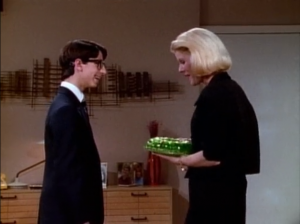In character-based, episodic shows like The Wonder Years, one of the oldest tricks in the book is to select two characters who don’t often interact and center a plot around them. Figure out the ways they’re similar, the ways they’re different, and construct a situation in which the two play off of each other. Cocoa and Sympathy is a textbook example of this technique.
We’ve seen lots of Norma, even more of Paul, but rarely more than an occasional line of them interacting. Cocoa and Sympathy considers mostly how they’re similar: both are disenfranchised in their own lives to a certain extent. Paul is judged as the brainiest eighth grade boy by Lisa Berlini in her annual poll of all the boys in the grade. Of course, anyone with a reasonable sense of scope would be able to tell you that “brainiest” is a rare bit of praise that could have actual application in life; yet, Paul is distraught that he didn’t win something more pleasant like Kevin’s Best Smile.
Kevin isn’t particularly worked up about the poll, in part because he’s a hair wiser than the average eighth grader and in part because he was handed a nice label. So Paul finds an unlikely source of sympathy in Norma. Norma’s facing her own crisis, albeit a much larger, slower-building crisis: Her life is a product of routine and monotony. Her children and husband don’t really care to open up to her. She’s largely taken for granted by her own family.
Most of the episode focuses on Kevin’s growing discomfort at the building bond between Paul and Norma, particularly from Paul’s end. Paul starts noting and sharing things about Norma that would put any son in a slightly uncomfortable position. Kevin doesn’t want to think of his mom as a woman. Just as a parent.
This culminates in a night out — no one would take Norma up on her idea to go see a concert, so Paul agrees to go. At the end of the night, Norma turns down a rose from Paul, thereby ending his attempt at a misguided courtship. But she gives him something bigger — a greater sense of self-confidence. Jack sees the kind way that she reaches out to Paul, and makes his own gesture of kindness by offering to see the next concert with her. Kevin comes to further appreciate his complex, deeply caring mother.
I liked the conclusion of the episode and appreciate the different sides of the characters that we get to see here, but large sections of the plot didn’t work for me. I could almost feel the writers trying to come up with a full plot to build around the pairing. The best episodes of The Wonder Years come from the top down, with a great theme leading to a great conflict leading to great character development and situations. Cocoa and Sympathy felt like it came from the bottom up — a situation (Norma and Paul connecting) led to the writers writing a conflict which led to them trying to add a good theme.
Again, it’s not a bad episode. It’s just one that doesn’t stick out as particularly special or memorable among a batch of truly phenomenal episodes during the second half of this season.





